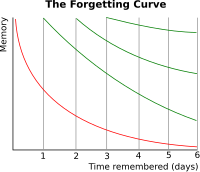Today I went back to Nelson Cowan's article, "What are the differences between long-term, short-term and working memory," as he appeared to be a definitive expert on the subject. Cowan is the Curators' Professor of Psychology at the University of Missouri and specializes in working memory research.
I'd certainly heard of long-term and short-term memory and could conceptualize those fairly easily, or so I thought. I can vividly remember a scene with each of my paternal grandparents. Grandpa Sam was angry with my first dog and kicked at her; so I kicked him. I was four or five and in trouble!
Years later, after my grandfather died, I remember Grandma Pearl dancing in her living room while watching American Bandstand. She must have been in her mid-seventies and seemed very old to me then.
Short-term memory, to me, has always been the capacity to recall something told you a brief time ago. I just got a phone call from a woman my wife Lynnette had contacted about someone who wished to volunteer at Bas Bleu, the local theatre we've been connected to for the last fourteen years. The staffer from the theatre said to tell the potential volunteer to go online to the Bas Bleu website and fill in a preliminary form.
I heard that message, but knew I'd be doing at least three other things before Lynnette got home, so I wrote her a note rather than trying to remember, later in the day, that I had a message to pass on to her.
An online article in psychology.about.com mentions the Ebbinghaus forgetting curve, published by a German psychologist in 1885. In one of the first scientific studies of how we do or don't retain information, Herman Ebbinghaus, who had begun his memory work in 1879, used himself as a research subject. He utilized three-letter "nonsense syllables. All began with a consonant, followed by a vowel and another consonant. He eliminated any where the consonant was a repeat (e.g., CAC) or where an actual word or prior meaning could play a role (DOT or BOL ~Ball). That left 2,300 possible combinations.
Then he'd put the syllables in a box, pull out some at random, write them down and repeat them many times to the beat of a metronome.
His results are still thought relevant now with later research by others to support them. The forgetting curve is the most famous. The sharpest decline occurs in the first twenty minutes and the decay is significant through the first hour. The curve levels off after about one day.
Cowan's paper mentions that those two forms of memory differ in some fundamental ways: short-term memory exhibits temporal decay and has chunk-capacity limits. In other words, over time we lose memories we have not committed firmly to long-term memory and we are only able to focus our attention on a limited number of items at a given time.
If you are asked to remember a hypothetical phone number, e.g., (800) 264-7813 and repeat it often enough, you may remember it next week. But, unless it's a number you use frequently, you're unlikely to remember it next month. And if you are presented with the task of remembering a number with forty digits, you probably can't memorize it at all.
Cowan notes three differing definitions of working memory: they all make sense to me, but I'll give examples of only two. The first is using your short-term memory to solve a problem (Cowan terms this a cognitive task). So if you give me the ingredients you'd like in an omelet, I'll start breaking the eggs. Another, that I've become more and more familiar with as I age is the use of attention to manage short-term memory. I watch teens and twenty-somethings multi-task with considerable amazement; if I want to remember something, I need to focus on it and if I'm in the midst of doing something that requires my attention and another item pops up (e.g., the phone message I received a few hours ago), it's best if I write it down.
Enough for today; I just remembered I have another task to finish this evening.
Tags: chunk capacity, Dr. Elizabeth Loftus, Dr. Nelson Cowan, Ebbinghaus forgetting curve, false memories, long-term memory, Nelson Cowan, short-term memory, temporal decay



